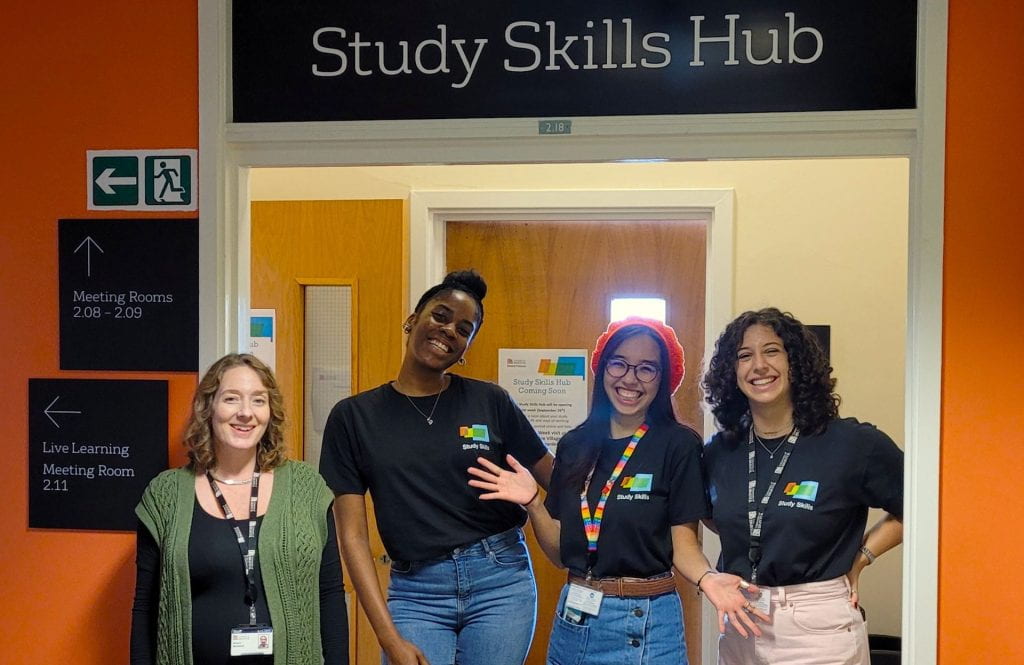It’s very common for students to have part-time work and study at the same time, but that can bring pressures and difficulties in managing your time. Here, the Bristol Futures Student Advocates share their ideas, tips and experiences of balancing part-time work and study.
How do I split my time and priorities between work and study?
Many students choose to take on part-time jobs to support them financially while at university. However, it is important to keep in mind how many contact hours you have a week/ how many hours of work you are expected to put in outside of those hours. For example, some weeks I’ll have quite a lot of contact hours, which means that I have less availability to work and so flexibility within a job is important to me.
Additionally, time management becomes more important when taking on a part-time job that fits around your studying. Some people may prefer to work more weekends and complete most of their course-related tasks during the week, while others may prefer to work in a job during the week and use the weekend to catch-up on university work. Either way, it can help to visualise the next week ahead before it starts and make sure you know when your shifts are, when you have university and anything else you might have planned.
Having a job as a student might also make having a good work-life balance challenging. Making sure you have time do things that you enjoy outside of a job and university is important for your mental-wellbeing, so don’t be afraid to politely decline a work shift if it means you won’t have the time to do things you enjoy too.
Ana Maria FB, BVSc1

Balancing part-time work with studies, especially in engineering, requires careful planning to ensure that academic progress isn’t negatively impacted. As an international student, adhering to the 20-hour work limit is essential to maintain visa compliance. It’s crucial to manage work hours in a way that doesn’t conflict with important study times, especially during major deadlines.
In group projects, effective communication is key. I rely on platforms like Slack or Microsoft Teams to keep everyone updated. Ideally, I’d prefer a job near campus with flexible hours, so I can work around lab sessions and group meetings. Academics must always take precedence, as a strong academic record can open more career opportunities. It’s important to recognise personal limits and explore alternatives like scholarships or financial planning. Discussing plans with tutors or supervisors can also offer valuable insights and help avoid potential challenges.
Ultimately, balancing work and study is possible with clear priorities, effective time management, and self-awareness.
Eliana Garcia, Mechanical an Electrical engineering, year 3
How do I manage my work shifts around my studies?
As a student, studying has always been my first priority but sometimes I would also like to do some part-time work to have some extra money. The key is to have some flexibility so that you have room to adjust. For example, I will have 2 days in a week for academic preparation, revision and coursework completion (if necessary). I always arrange my part-time shifts in between my lectures for other weekdays. Most university part-time jobs are flexible so you can arrange shifts that fit your schedule in most of the time. If not, you are always welcomed to email the manager to address that issue.
Ho Wang Adrian Tung, BSc Biomedical Sciences Year 2

On paper, following a plan works really well, but sometimes, life gets in the way and all you can do to tackle it is flexibility. During busy assessment weeks and times where I feel overwhelmed, asking people for help is always the solution: speaking to my manager to take on less shifts a certain week, asking if anyone can help cover my shifts, or as simple as blurting out everything on my mind to a friend.
Louna Larose, Psychology BSc Year 2
I have two criteria when selecting a part-time work: whether the shifts are flexible and whether it is far from the university. Most of parttime jobs I do are flexible in time: If I have a time conflicts, I contact the team leader as soon as possible, and they can find someone to cover for me. But for some works, I am required to give, for instance, three days’ notice. Therefore, my suggestion is to discuss this with your team leader, know their requirements, and contact them ASAP if your plan changes. Also, I prefer to work near the university to save time. If a work requires me to travel for an hour, generally I will not consider it.
Jiamiao Chen, PhD, Department of English
What are the specific impacts of my course on managing a part-time job?
The most significant impact of a part-time job on my study is losing my revision and free time. However, this can be solved by organized time-management (having flexibility) as mentioned above. Part-time jobs might increase stress as you are bearing more responsibility. Always talk to someone whom you feel comfortable with if you find your stress is affecting your wellbeing. Regarding legal requirements, always check how many hours your visa allows you to work and make sure you commit to it.
Ho Wang Adrian Tung, BSc Biomedical Sciences Year 2

Balancing part-time work and studies isn’t always easy, especially as a final year student, but with some planning and flexibility, it’s definitely doable.
Since I’m in final year, studying is my top priority so I keep everything organised by scheduling my classes, shifts and study sessions on my phone calendar. Having it all in one place helps me stay on top of things and avoid double-booking myself. I always block out at least three full days each week for revision, coursework, and exam prep, while planning my shifts on other days around my other commitments.
When deadlines pile up or my course gets more demanding, I’ve found it really helpful to communicate with my manager. I love the flexibility that part-time university jobs offer because they make it so much easier to fit work around my academic commitments, which is so important during a busy year like this.
Of course, balancing work and study can sometimes feel overwhelming, but having a clear schedule and being able to adjust when needed really helps. Taking breaks and talking to friends when I’m stressed also keeps me feeling grounded.
Maansi Gupta, Economics Year 3
As an international student how do I manage legal requirements, work and study?

As an international student working on a student visa and restricted to work no more than 20 hours per week, the most important thing to bear in mind is that I should keep my working hours strictly within this limit. Considering how expensive living in Bristol is, I am often tempted to work for 20 hours each week. However, studying should always be prioritised over working, and whenever there are time conflicts between my work and my seminars or lectures, I always choose to attend academic lectures. There will be plenty of time for us to work after graduation, and what you learn now can prepare you to find more suitable work in the future. So, the most significant thing is to resist the temptation to spend too much time on your part-time work!
Jiamiao Chen, PhD, Department of English
Being an international student has many challenges, firstly, coming to a new country, new place, and getting to know new people. It is scary how you can adjust to university life with a blink of an eye. I enjoyed my academic life, assessments, and modules. I loved how interactive and social University of Bristol is, especially when it comes to its diverse schemes for student jobs. Being a student advocate has opened so many doors for me. I loved working with students, interacting with different tutors and mentors, it was a nice change from all the academic studying.
Sarah Al-Shahabi, MSci Cancer Biology and Immunology
As an international student, my legal requirements are to work no more than 20 hours per week during term time, ensuring that enough time is focussed on my studies at the same time. Balancing work and studies can be tricky but it is a learning curve and just takes some practice. And overall, makes my university life just that much more fruitful and fulfilling.
Louna Larose, Psychology BSc Year 2
How does a part-time job impact my wellbeing?
Balancing work, life, and academics is something everyone strives for, and with proper organisation, it can be quite achievable. Managing my time was actually one of my favourite parts. Something as simple as an Outlook planning session each week made a huge difference in keeping my schedule organised. I loved having the flexibility to set my own working hours, report to my managers, and connect with students from different courses and backgrounds. It made balancing everything so much easier and more enjoyable. The people I met through study skills at the university were some of the kindest, most inspiring individuals, and I feel lucky to have been part of that.
Sarah Al-Shahabi, MSci Cancer Biology and Immunology
A big part of university is the experiences you gain alongside your studies. For me, that’s balancing academics with social life, sports and a part-time job. I plan my day by time-blocking hours dedicated to each activity and prioritising. This challenges me to work more efficiently and effectively in the time period I give myself. At the same time, having a range of activities helps motivate me to work harder during my study blocks.
Louna Larose, Psychology BSc Year 2
If you want to learn more about balancing work with studies check out the other blog posts in our series.




 First, create a revision schedule, which will help you to stay organized and focused. For example, I block out time on my calendar to revise specific topics and include dedicated break times.
First, create a revision schedule, which will help you to stay organized and focused. For example, I block out time on my calendar to revise specific topics and include dedicated break times.







